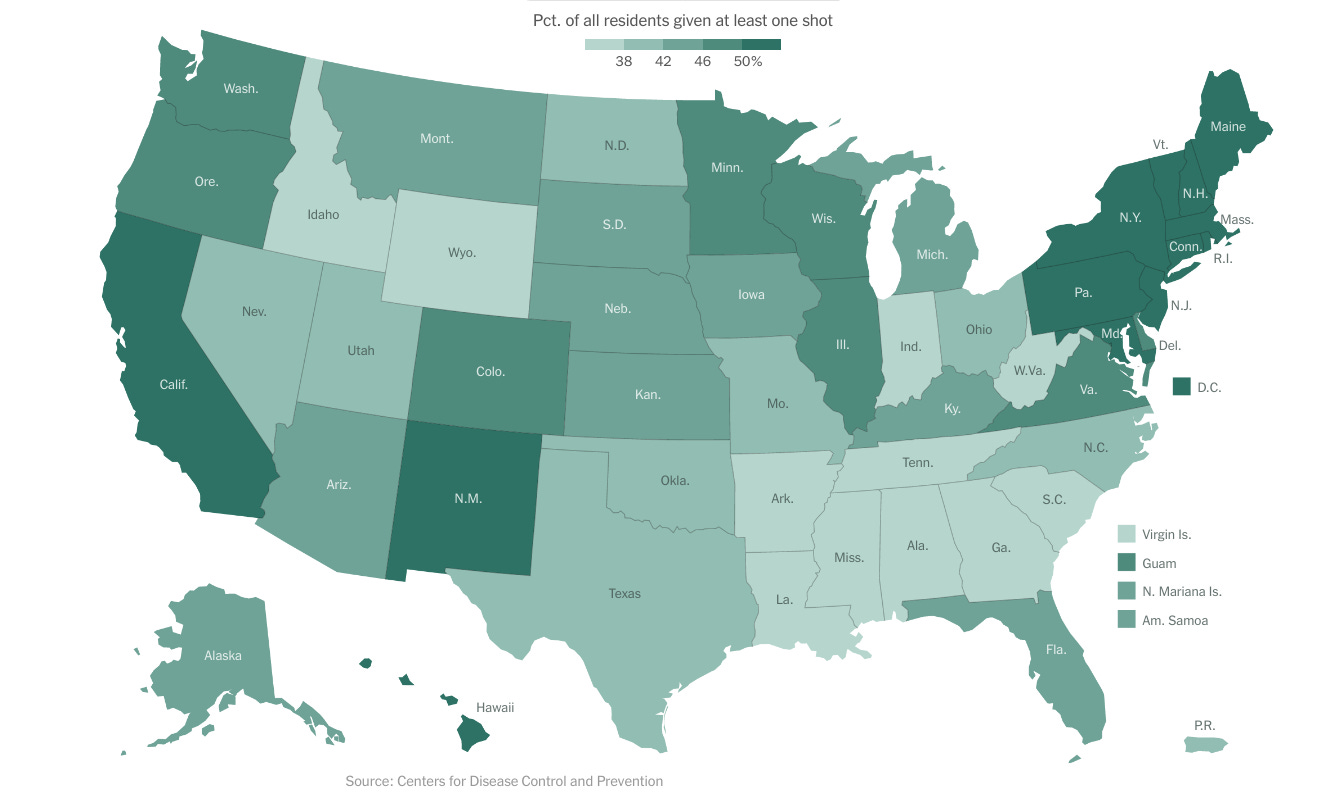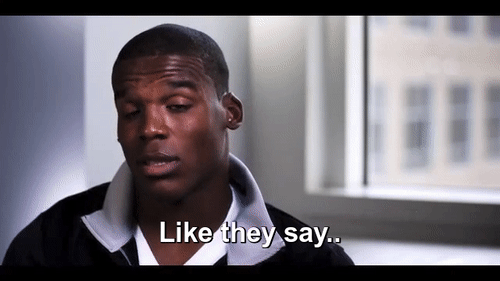It’s been a hell of a time this last year-plus, but—at least here in the United States—there’s finally a clear path back to normalcy. After a few months of frantic, late-night online-lottery-scrambling, we’ve reached a place in our ongoing public health situation where the three safe, highly-effective FDA-approved COVID-19 vaccines are available pretty much anywhere to anyone. It’s wild! Two months ago I drove 200 miles round-trip to get my first shot; this Sunday afternoon, I walked past a big sign while shopping in Kroger that said “vaccines available now!” The tool that’s finally capable of restoring normalcy to society is accessible to almost anyone over the age of 16 in this country.
Except not enough people want it.
One of my worst hobbies over the last 15 months has been visiting—multiple times daily—the New York Times’ “Coronavirus In The US” page, which offers some really engrossing data visualization in the form of county-by-county maps of cases, rates, trends, etc. For no mentally-healthy reason, I’ve pored obsessively over these maps, like anything might be accomplished by me knowing what’s going on in Ward County, North Dakota right now. From February through April, though, I was heartened to see their daily counts of vaccine doses delivered climbing ever higher, the 7-day average peaking at nearly 3.4M shots administered per day by April 13th.
And it’s been in freefall ever since.
We don’t need to dwell on the why of this scenario—the peculiar mix of malicious actors and endemic stupidity that underpins so much of daily life in this country has been well-covered by writers far more equipped than I to capture it. What I want to talk about today is finding a solution.
A variety of ideas have been floated to sway the reluctant, knowing that herd immunity likely won’t be reached until more than 70% of the population is inoculated. Some offer a carrot—West Virginia governor Jim Justice proposed offering $100 savings bonds to young people who get vaccinated—while others prefer a stick, suggesting banning unvaccinated people from a range of public and private activities. Celebrities have been deputized for public-health messaging, doctors have taken to the airwaves to emphasize the drugs’ safety and efficacy. Some places are even just hoping a free beer might do the trick.
But it’s not moving the needle, and so I think we need to think bigger.
We need to bring in the bagmen.
The who?
Take a look at this map, showing the current percentage of people vaccinated in each state.
Now, I’m not going to turn this into a regional pissing contest; I’m an Ohio-born Kentucky resident who bristles hard at any sneering coastal superiority. But it’s not hard to squint at this image and realize that, with a few exceptions, it’s a rough inverse of “places where college sports matter a lot”.
I think we can use that information to our advantage, and maybe do some good in the process.
College sports are a huge business. Hundreds of billions of dollars flow through the sport each year, and it they almost never go to the athletes who make it possible. There is a growing push in many states to finally allow student-athletes to profit off their name, image and likeness (NIL), thankfully, but for over a century, the only way for a collegiate athlete to truly make money before turning professional has been to take it under the table. A well-heeled booster, a shady agent, or a scheming apparel company quietly funnels funds through intermediaries, and suddenly a top-flight recruit decides they’ve always dreamed of playing at [looks at notecard] Ole Miss.
Moral scolds and NCAA apologists act like it’s a bad thing, but in the end it’s just rich peoples’ money going to deserving young athletes and their families. If you’re mad about that, it’s probably just because your team isn’t as good at doing it without getting caught.
It’s in this spirit that I’m proposing a targeted government stimulus program, one I’m calling the “Build Bag Better” plan. It’s simple, victimless, and likely to be highly effective.
Okay, so how’s it work?
Simple. Top-rated high school recruits are quietly offered a significant financial payment from the federal government to state publicly that they will only commit to schools in states or communities that have reached a certain threshold—let’s say 70%—of vaccinated residents.
That’s it?
That’s it. It’d cost a pittance in the context of federal funds being spent on the public health crisis writ large. We’re talking about multi-trillion-dollar stimulus bills, but for a small fraction of that—$125 million, say—you could offer a Cam Newton-sized quarter-million dollars to 500 top athletes. They get the life-changing money they deserve for putting their bodies on the line for schools reaping windfalls in television contracts, and all they’d have to do is agree to a small bit of collusion.
Sounds illegal.
Listen, I’m not a lawyer, but if you explain it in dry terms, pretty much everything involved in college athletics sounds illegal. This is hardly new ground. Plus, I don’t think it would actually be illegal—just counter to NCAA rules of amateurism, which are bullshit anyway. This would be a direct government attack on that model, and that’s just a side benefit. The real goal would be to get college sports fans—a demographic that’s likely more resistant than the general population to vaccination—to stop thinking about their own feelings, and start thinking about the good of the team.
Wait, the good of the team?
Yeah! Look at that map. If you’re a fan of a traditional power program, do you really want to risk that top defensive tackle or quarterback deciding to play at Penn State, Boston College or—heaven forbid—Syracuse?? One bad recruiting class can throw off a program’s whole trajectory, and you don’t want that on your head. Think of all the time you’ve spent tweeting at recruits about how much they’re gonna love the culture in Clemson or Austin or South Bend. You’re gonna blow that now just because you don’t want to get a jab in the arm?
If you wanted to let one little prick stand in the way of you winning a championship, you would’ve hired Tommy Tuberville.
Couldn’t the targeted places just resist the idea en masse?
Theoretically, yes, but if you’re in a place that traditionally struggles to get the top recruits in your conference—Arkansas or Indiana, for instance—suddenly there’s a chance to up your chances at the expense of Alabama or Ohio. It become’s a prisoner’s dilemma of sorts; you’ve got to act without knowing how your counterparts will.
Won’t some politicians oppose this?
If you ask them before doing it, sure. Just sneak it in there. Come on, no one’s really counting all of this. Say it’s for space research. People love space. Besides, the goal is to turn it into an arms race. You don’t win an arms race by crying foul to the refs.
Isn’t this treating athletes a little bit like pawns?
Again, I refer you back literally everything else about college athletics.
One step toward acknowledging that student-athletes are real people with personal autonomy and not just pieces on a board game would be to actually compensate them for the value they bring to a massive industry.
Okay, but it will be uncovered eventually. People will notice when all the good recruits are suddenly committing to UMass or New Mexico State.
Yeah, but investigations take a while, and by then the players have made their money, moved on to the pros, and the Minutemen or Aggies can take whatever sanctions the NCAA hands out while proudly flying their CFB Playoff Championship banner.
Are there any historical precedents for this?
Aristophanes’ ancient Greek comedy Lysistrata, sort of, if you swap “holding out sex to end a war” for “holding out athletic talent to end a pandemic”. It’s basically the same thing, but with fewer boner jokes.
Okay, one more question.
Hit me.
Wouldn’t this give the Big Ten a better chance to win a title?
Listen, no plan’s gonna be perfect.
—Scott Hines (@actioncookbook)






Given the differentials in vaccine hesitancy between men and women, I thought you were going to advocate an actual Lysistrata -- which also may be a good idea, now that we mention it.
This is better, but less fun, than my "tase the anti-vax" proposal. Turns out I'm not authorized to reenact Scanners. Yet.